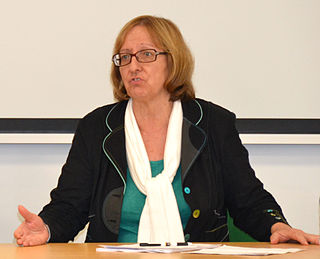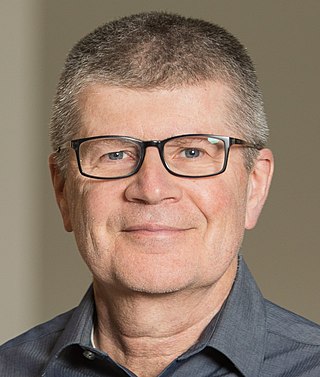Related Research Articles

Scripps Research is a nonprofit American medical research facility that focuses on research and education in the biomedical sciences. Headquartered in San Diego, California, the institute has over 170 laboratories employing 2,100 scientists, technicians, graduate students, and administrative and other staff.

Linda Brown Buck is an American biologist best known for her work on the olfactory system. She was awarded the 2004 Nobel Prize in Physiology or Medicine, along with Richard Axel, for their work on olfactory receptors. She is currently on the faculty of the Fred Hutchinson Cancer Research Center in Seattle.

Elvin Abraham Kabat was an American biomedical scientist and one of the founding fathers of quantitative immunochemistry. Kabat was awarded the Louisa Gross Horwitz Prize from Columbia University in 1977, National Medal of Science in 1991, and American Association of Immunologists Lifetime Achievement Award in 1995. He is the father of Jon Kabat-Zinn.
Emil Raphael Unanue was a Cuban-American immunologist and Paul & Ellen Lacy Professor Emeritus at Washington University School of Medicine. He is a member of the National Academy of Sciences, the American Academy of Arts and Sciences and the Institute of Medicine. He previously served as chair of the National Academy of Sciences Section of Microbiology and Immunology.
Charles Alderson Janeway, Jr. was an American immunologist who helped create the modern field of innate immunity. A member of the National Academy of Sciences, he held a faculty position at Yale University's Medical School and was an Howard Hughes Medical Institute Investigator.

Kimishige "Kimi" Ishizaka was a Japanese immunologist who, with his wife Teruko Ishizaka, discovered the antibody class Immunoglobulin E (IgE) in 1966–1967. Their work was regarded as a major breakthrough in the understanding of allergy. He was awarded the 1973 Gairdner Foundation International Award and the 2000 Japan Prize for his work in immunology.

Philippa "Pippa" Marrack, FRS is an English immunologist and academic, based in the United States, best known for her research and discoveries pertaining to T cells. Marrack is the Ida and Cecil Green Professor and chair of the Department of Biomedical Research at National Jewish Health and a distinguished professor of immunology and microbiology at the University of Colorado Denver.

Anne O'Garra FRS FMedSci is a British immunologist who has made important discoveries on the mechanism of action of Interleukin 10.

James Patrick Allison is an American immunologist and Nobel laureate who holds the position of professor and chair of immunology and executive director of immunotherapy platform at the MD Anderson Cancer Center in Houston, Texas. Allison is Regental Professor and Founding-Director of James P. Allison Institute at the MD Anderson Cancer Center.
J. (Joseph) Donald Capra was an American immunologist, physician-scientist, and was the 4th full-time president (1997–2007) and later, president emeritus, of the Oklahoma Medical Research Foundation (OMRF) in Oklahoma City, OK. While president, he helped to raise over $100 million and spearheaded major research growth in grants funded and faculty recruited to the institution.

Max Dale Cooper, is an American immunologist and a professor at the Department of Pathology and Laboratory Medicine and the Emory Vaccine Center of Emory University School of Medicine. He is known for characterizing T cells and B cells.

Akiko Iwasaki is a Sterling Professor of Immunobiology and Molecular, Cellular and Developmental Biology at Yale University. She is also a principal investigator at the Howard Hughes Medical Institute. Her research interests include innate immunity, autophagy, inflammasomes, sexually transmitted infections, herpes simplex virus, human papillomavirus, respiratory virus infections, influenza infection, T cell immunity, commensal bacteria, COVID-19, and long COVID.

Carl H. June is an American immunologist and oncologist. He is currently the Richard W. Vague Professor in Immunotherapy in the Department of Pathology and Laboratory Medicine at the Perelman School of Medicine of the University of Pennsylvania. He is most well known for his research on T cell therapies for the treatment of several forms of cancers. In 2020 he was elected to the American Philosophical Society.
Sangita Mukhopadhyay is an Indian molecular cell biologist, immunologist and the head of the molecular biology group at the Centre for DNA Fingerprinting and Diagnostics. Known for her studies on immunosuppression and infection biology, Mukhopadhyay is an elected fellow of all the three major Indian science academies namely the Indian National Science Academy, the Indian Academy of Sciences and the National Academy of Sciences, India. The Department of Biotechnology of the Government of India awarded her the National Bioscience Award for Career Development, one of the highest Indian science awards, for her contributions to biosciences in 2008.
Jacques Banchereau is an internationally prominent French American immunologist and molecular biologist. As of 2022, he is Chief Scientific Officer at Immunai. He was formerly professor and director of immunological sciences at the Jackson Laboratory for Genomic Medicine and also the former chief science officer, senior vice president, and DTA head of inflammation & virology at Hoffman-La Roche. He is best known for his extensive research on dendritic cells with Nobel Laureate Ralph M. Steinman. He is the fifth most cited immunologist ranked by Times Higher Education's report.
Misty Rayna Jenkins is an Australian scientist known for her research into lymphocytes and cancer treatment.
Wendy Havran was an American immunologist at the Scripps Research Institute. She specialized in T cells, showing that they are scarce in certain areas of the body.

Carla V. Rothlin is an Argentinian immunologist. She is a professor of immunobiology at Yale University, where she holds the Dorys McConnell Duberg Professorship, and also serves as a professor of pharmacology. Rothlin is the co-leader of the Cancer Immunology Program at Yale Cancer Center and a Howard Hughes Medical Investigator Faculty Scholar.

Marc K. Jenkins is a Regents Professor and Director of the Center for Immunology at the University of Minnesota. He is a member of the National Academy of Sciences.
Mitzi Nagarkatti is a researcher and a university administrator who has served as the Chair of the Department of Pathology, Microbiology and Immunology at the University of South Carolina (USC) School of Medicine at Columbia, SC, since 2005. She is also the SmartState Endowed Chair of the Center for Cancer Drug Discovery and Carolina Distinguished Professor. She pursues research in inflammatory diseases, immunotoxicology, and immunopharmacology. She has been recognized for her research contributions through numerous awards leading to her election as a Fellow of the American Association for the Advancement of Science (AAAS), Fellow of the Academy of Toxicological Sciences, Fellow of the National Academy of Inventors, and Fellow of the American Academy of Microbiology.
References
- 1 2 3 4 5 6 Mak, Tak W. & Mary E. Saudners. Primer to the Immune Response. Burlington, MA: Academic Press, 2008. ix.
- ↑ Fernandez-Botran, Rafael, Paula M. Chilton, & Yuhe Ma. "Soluble Cytokine Receptors: Their Roles in Immunoregulation, Disease, and Therapy." Advances in Immunology, Volume 63 San Diego, CA: Academic Press, 1996. 316.
- 1 2 "Ellen Vitetta, Ph.D. - Faculty Profile - UT Southwestern". profiles.utsouthwestern.edu. Retrieved 2020-09-02.
- 1 2 3 "Ellen S. Vitetta, Ph.D." The American Association of Immunologists.
- ↑ "Ellen Vitetta - Google Scholar". scholar.google.com. Retrieved 2020-09-02.
- 1 2 "Dr. Ellen Vitetta - Texas Women's Hall of Fame - Texas Woman's University". twu.edu. Retrieved 2020-09-02.
- ↑ "Ellen Vitetta Named to Texas Women's Hall of Fame". www.medica-tradefair.com. Retrieved 2020-09-02.
- ↑ "Past Recipients". The American Association of Immunologists. Retrieved 19 September 2018.